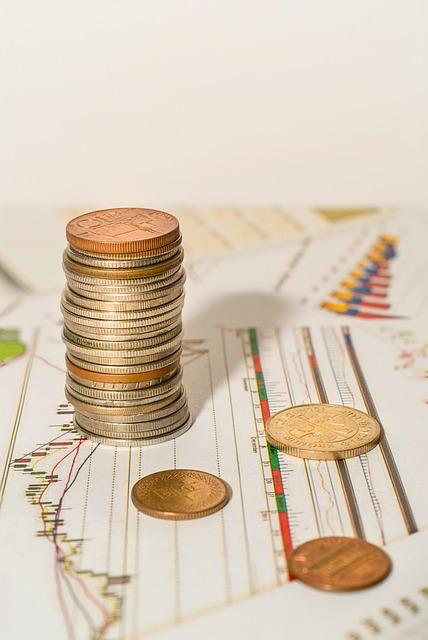Ever wondered what realy goes on inside the brain of an economy expert? Sure, they throw around fancy terms like “inflation” and “market equilibrium,” but there’s so much more beneath the surface. In this post, we’re diving into the mindset of those who analyze trends, predict crashes, and try to make sense of the unpredictable world of money. Whether you’re a numbers nerd or just curious about how economic pros think, stick around—this peek inside their world might just change how you see the economy (and maybe your own wallet, too).
Understanding Economic Trends Like a Pro
Mastering the complexities of economic shifts is less about memorizing data and more about developing a keen sense of patterns and signals that often go unnoticed.Experts don’t just watch numbers—they watch behaviors. For instance, consumer confidence indexes and job growth rates are more telling than raw GDP figures because they reveal underlying moods in the market. Understanding the ripple effects of international trade policies or technological innovations means you’re connecting dots that most overlook, giving you an edge in anticipating what’s next.
To think like an economy expert, start treating economic indicators as a story rather than a cold spreadsheet.Here’s a quick cheat sheet to get you started:
- Inflation Rates: Signals changes in purchasing power and guides interest rate predictions.
- Unemployment Data: Reveals labor market health and consumer spending potential.
- Consumer Confidence: Measures optimism wich frequently enough drives economic momentum.
- Trade Balances: Indicates competitive advantage and currency stability.
| Indicator | What to Watch | Why It Matters |
|---|---|---|
| Inflation Rate | Rising prices above 2% | Signals possible interest rate hikes |
| unemployment | Below 5% | Indicates tightening labor market & wage growth |
| consumer Confidence | Above 100 index points | Predicts higher consumer spending |
| Trade Balance | Deficit narrowing | Improves currency strength |

How Experts Decode Market Signals You Shouldn’t Ignore
Experts have an uncanny way of sifting through a sea of confusing data and extracting the nuggets that actually matter. Instead of reacting to every headline or fleeting trend,they focus on key indicators that reveal the market’s underlying health—things like consumer confidence indexes,employment rates,and manufacturing outputs. These signals frequently enough act like an economic compass, guiding them to anticipate market shifts before they hit mainstream awareness.
Here are some of the subtle signs they zero in on that everyone else tends to miss:
- Yield curve movements: an inverted yield curve can hint at upcoming recessions.
- Inventory levels: rising stockpiles may imply sluggish demand ahead.
- Consumer spending patterns: small changes in retail habits often forecast broader economic turns.
- Corporate earnings whispers: subtle changes in earnings forecasts can reveal shifts in business confidence.
| market Signal | What It Indicates |
|---|---|
| Inverted Yield Curve | potential economic slowdown |
| Rising Inventories | Weakening consumer demand |
| Sudden Spending Shifts | Changing consumer confidence |
| Earnings Forecast Changes | Business outlook revisions |

The Secrets Behind Making Smart Financial Predictions
Understanding market trends and economic indicators is like piecing together a complex puzzle. experts dive deep into historical data, studying patterns and anomalies that have shaped past financial landscapes. They don’t just rely on numbers; they keep a close eye on global events, policy changes, and technological innovations that can dramatically sway markets overnight. It’s this blend of rigorous analysis and intuitive grasp of external factors that forms the backbone of smart predictions.
To stay ahead, economy mavens use a variety of tools and methods, such as:
- Sentiment analysis: Tapping into public mood through social media and news outlets.
- Economic simulations: Running what-if scenarios to test how certain variables may impact outcomes.
- Machine learning models: Leveraging AI to detect subtle correlations invisible to the naked eye.
| Indicator | What It Shows | Why It Matters |
|---|---|---|
| Consumer Confidence | Public optimism about economy | Predicts spending behavior |
| Interest Rates | Cost of borrowing money | Affects investment and loans |
| Unemployment Rate | Job market health | Influences consumer buying power |
Tips from the experts to Boost Your Money Moves
When it comes to making smarter financial decisions, experts frequently enough emphasize the importance of diversifying your income streams. Not relying solely on one source of income can provide a safety net during unpredictable times.Additionally, keeping a close eye on spending habits through budgeting apps or simple spreadsheets can reveal hidden leaks in your finances.Remember, the key isn’t just how much you earn but how effectively you manage it.
Another golden nugget from economic pros is mastering the art of timing—whether it’s investing in stocks, buying property, or even making everyday purchases. Making informed moves involves understanding market cycles, but also doesn’t mean constantly trying to predict the future. Sometimes, the simplest approach wins:
- Automate your savings to build discipline effortlessly.
- Keep learning about financial tools and trends—knowledge compounds over time.
- Beware of lifestyle inflation—earning more doesn’t have to mean spending more.
| Expert Tip | Why It Works | Quick Action |
|---|---|---|
| Emergency Fund | Prepares you for unexpected events | Save 3-6 months expenses |
| Invest Regularly | Smooths out market fluctuations | Use dollar-cost averaging |
| Track Your Net Worth | Measures your financial progress | Update monthly |
Why Emotional Control Is key in economic Decision Making
When it comes to making smart economic choices, keeping your emotions in check isn’t just helpful—it’s essential. Economic experts know that decisions driven by panic, greed, or over-optimism often lead to costly mistakes. Instead, they rely on a balanced mindset to analyze data, assess risks, and anticipate market trends without getting swept up in the moment. This emotional discipline enables them to navigate volatility without making rash moves, turning what could be chaos into calculated prospect.
Here are some key reasons why emotional control is a game-changer in economics:
- Prevents impulsive buying or selling, which can erode long-term gains.
- Enhances objective analysis by keeping biases at bay.
- Protects against herd mentality, allowing unique strategies to thrive.
- Improves patience, critical for investments that take time to mature.
| Emotion | Typical Pitfall | Expert Control Strategy |
|---|---|---|
| fear | Sudden market sell-offs | Setting pre-defined stop-loss limits |
| Greed | Overinvesting in hype | Strict portfolio diversification |
| Overconfidence | Ignoring warning signs | Regular performance reviews |
Q&A
Inside the Mind of an Economy expert: What You Should Know
Q&A Style blog
Q: So, what exactly does an economy expert do?
A: Great question! Simply put, economy experts analyze how money, goods, and services move around – in countries, businesses, and even your wallet. They look at trends, data, and policies to predict what might happen next, helping everyone from governments to companies make smarter decisions.
Q: Do they just crunch numbers all day?
A: Nope! While numbers are a big part of it, economy experts also need to understand human behavior, politics, and even psychology. Economics is part math, part art. It’s about connecting the dots between data and real-world impact.
Q: What’s the biggest misconception about economy experts?
A: That they have a crystal ball! Many people think economists can predict recessions or booms with 100% accuracy. In reality, the economy is super complex and influenced by tons of unpredictable factors, so experts make educated guesses rather than certain predictions.
Q: How do economy experts stay updated?
A: They’re basically news junkies.They read tons of reports, keep an eye on global events, monitor financial markets, and chat with othre experts. Plus, they love digging into fresh data to spot new trends before they become headlines.
Q: Can understanding the economy help me in daily life?
A: Absolutely! Knowing a bit about the economy helps you make better financial decisions – like when to save, invest, or even what job skills might be in demand. It’s like having your own insider info on the financial world.
Q: What’s one thing economy experts wish everyone knew?
A: That economies are always changing. What worked yesterday might not work tomorrow. adaptability and staying informed are key. Also, economic policies are often a balancing act – what benefits one group might hurt another.
Q: Any tips for someone who wants to think like an economy expert?
A: Start by asking questions about how money flows around you. Read simple economic news or blogs. Pay attention to policies and how they affect communities. And don’t be afraid of numbers – a little math goes a long way!
got more questions about the mysterious world of economics? Drop a comment below, and let’s chat!
Wrapping Up
And there you have it—a little peek inside the engaging mind of an economy expert. Understanding how these pros think, analyze, and predict can give us all a leg up when it comes to making sense of the financial world around us. So next time you catch yourself scratching your head over market trends or economic news, just remember: it’s all about connecting the dots and staying curious. Keep digging, keep asking questions, and who knows—you might just start thinking like an economy expert yourself. Until next time,stay savvy!











